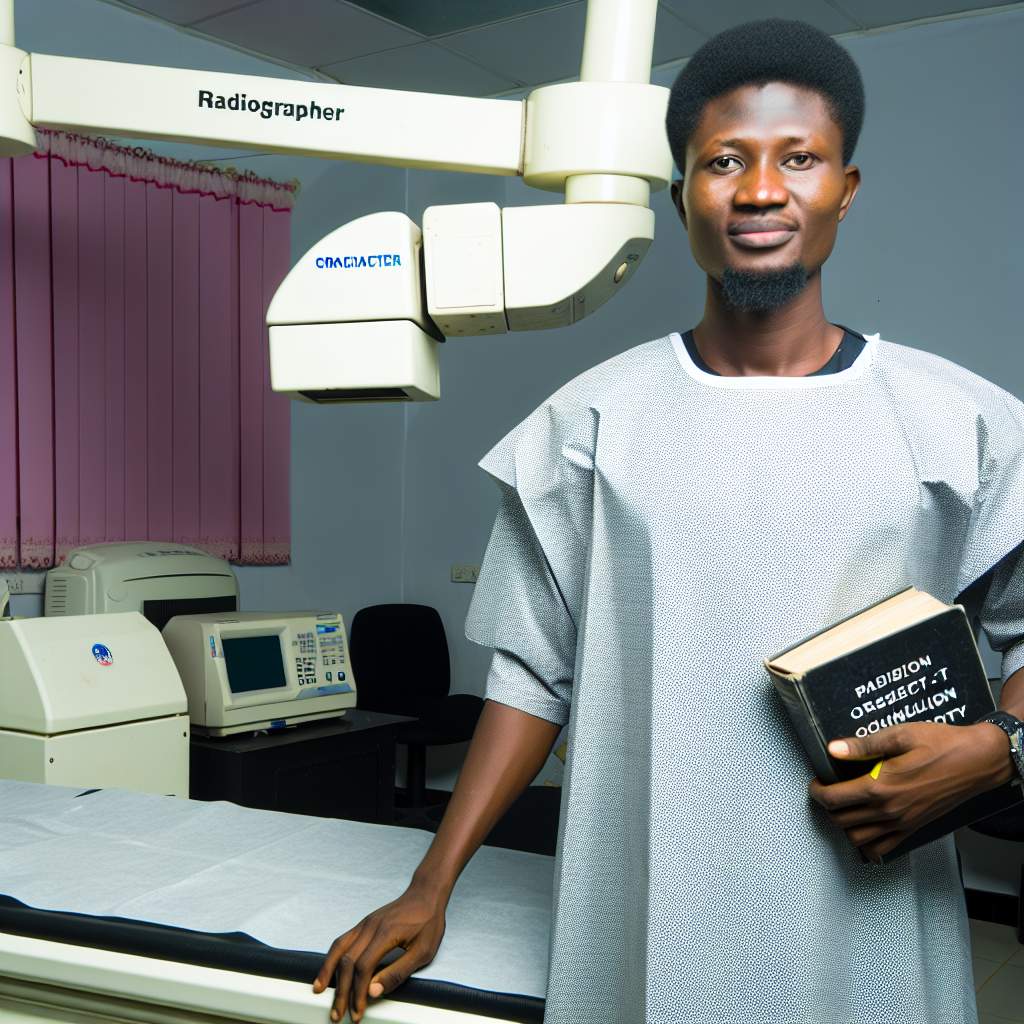Introduction:
Radiographers play a crucial role in medical imaging and radiation therapy in Nigeria.
It is essential for radiographers to adhere to a code of ethics to maintain professionalism.
History of Radiographers’ Code of Ethics in Nigeria:
Since the inception of radiography as a profession in Nigeria, there has been a need to establish a set of ethical guidelines to govern the practice of radiographers.
The development of the Radiographers’ Code of Ethics in Nigeria dates back to the early days of the profession.
Radiographers play a crucial role in the healthcare sector, as they are responsible for producing high-quality images to aid in the diagnosis and treatment of various medical conditions.
It is essential for radiographers to adhere to ethical standards to ensure the safety and well-being of patients.
The Radiographers’ Code of Ethics in Nigeria was created to provide radiographers with a framework for ethical practice.
This code serves as a guide for radiographers to uphold professional standards and conduct themselves with integrity in their interactions with patients, colleagues, and the public.
Key Elements of the Radiographers’ Code of Ethics in Nigeria:
- Professional Integrity: Radiographers are expected to demonstrate honesty, transparency, and accountability in all aspects of their work.
- Patient Confidentiality: Radiographers must respect the privacy and confidentiality of patients’ medical information.
- Professional Competence: Radiographers should continuously strive to improve their skills and knowledge to provide the best possible care for patients.
- Respect for Patients: Radiographers should treat patients with dignity, respect, and compassion at all times.
The Radiographers’ Code of Ethics in Nigeria outlines the ethical responsibilities of radiographers and provides guidance on how to navigate complex ethical dilemmas that may arise in the course of their work.
By adhering to these ethical standards, radiographers can promote trust, professionalism, and quality care in their practice.
Furthermore, the code of ethics helps to safeguard the reputation of the profession and maintain public trust in the healthcare system.
Radiographers who uphold these ethical standards contribute to the overall advancement of the profession and the delivery of safe and effective patient care.
The Radiographers’ Code of Ethics in Nigeria plays a vital role in shaping the practice of radiography in the country.
By establishing clear ethical guidelines and expectations, this code ensures that radiographers maintain the highest standards of professionalism, integrity, and patient-centered care in their daily work.
Core Principles of Radiographers’ Code of Ethics:
- Professionalism
- Integrity
- Confidentiality
Professionalism in radiography is vital for maintaining trust with patients and colleagues.
It involves adhering to high standards of conduct, competence, and ethical behavior.
Integrity is the foundation of a radiographer’s practice.
It entails honesty, accountability, and a commitment to doing what is right, even when faced with challenges.
Confidentiality is paramount in radiography to protect patients’ privacy and sensitive information.
Radiographers must ensure that patient data is safeguarded at all times.
Each of these principles plays a crucial role in upholding the ethical standards of the profession and ensuring the delivery of quality patient care.
Importance of Professionalism:
Professionalism in radiography instills confidence in patients, demonstrating that radiographers are competent, reliable, and dedicated to their work.
It also fosters respect among colleagues and other healthcare professionals.
By upholding professionalism, radiographers contribute to a positive work environment and promote interdisciplinary collaboration for better patient outcomes.
It helps to build a strong reputation for the profession and enhances the overall quality of healthcare delivery.
Significance of Integrity:
Integrity is essential for radiographers to establish trust with patients and maintain the integrity of the profession.
It is the backbone of ethical practice and ensures that radiographers act in the best interests of their patients.
By embodying integrity, radiographers uphold the values of honesty and transparency, which are crucial for building relationships based on trust and respect.
Integrity also helps radiographers make ethical decisions and maintain professional boundaries in their interactions with patients and colleagues.
Role of Confidentiality:
Confidentiality is a cornerstone of ethical practice in radiography.
It protects patients’ rights to privacy and confidentiality of their health information, instilling trust and confidence in the healthcare system.
Radiographers must uphold patient confidentiality by ensuring that sensitive information is not disclosed without proper authorization.
This ethical obligation is crucial for maintaining the trust of patients and preserving the integrity of the profession.
The core principles of professionalism, integrity, and confidentiality are essential elements of the Radiographers’ Code of Ethics in Nigeria.
Upholding these principles is crucial for maintaining high standards of practice, fostering trust with patients, and ensuring the integrity of the radiography profession.
Delve into the Subject: Continuing Professional Development for Radiographers
Responsibilities of Radiographers in Nigeria
In Nigeria, radiographers play a crucial role in the healthcare system by performing diagnostic imaging procedures and providing accurate results to help in patient care.
Their responsibilities are outlined in the Radiographers’ Code of Ethics, which guides their practice and ensures that they uphold professional standards.
Specific Roles and Responsibilities
- Performing various diagnostic imaging procedures such as X-rays, CT scans, MRIs, and ultrasounds.
- Ensuring the safety and comfort of patients during imaging procedures.
- Following safety protocols to minimize radiation exposure to patients and themselves.
- Interpreting imaging results accurately and communicating findings to physicians.
- Collaborating with other healthcare professionals to provide comprehensive care for patients.
- Keeping accurate records of imaging procedures and patient information.
These specific roles and responsibilities are crucial in ensuring that radiographers provide high-quality imaging services that contribute to accurate diagnosis and treatment of patients.
Importance of Adherence to the Code of Ethics
Adherence to the Radiographers’ Code of Ethics is essential for radiographers in Nigeria to fulfill their responsibilities effectively.
Transform Your Career with Expert Guidance
Get personalized mentorship consulting that’s tailored to your unique path. Our expert advice is actionable and exclusive.
Get StartedThe code of ethics outlines ethical principles and professional standards that radiographers must uphold in their practice.
By adhering to this code, radiographers can:
- Ensure patient safety and well-being during imaging procedures.
- Maintain confidentiality and privacy of patient information.
- Uphold the integrity and credibility of the profession.
- Promote respect and dignity in their interactions with patients and colleagues.
- Enhance trust and confidence in the healthcare system.
Adhering to the code of ethics not only benefits the patients but also strengthens the professionalism and reputation of the radiography profession in Nigeria.
It sets a standard of excellence and ethical conduct that radiographers must follow to maintain the trust and respect of patients, colleagues, and the community.
Discover More: Radiology and Radiography Conferences in Nigeria
Challenges Faced in Upholding the Code of Ethics:
In Nigeria, radiographers often encounter various challenges when trying to uphold the established Code of Ethics.
These challenges can range from institutional constraints to personal ethical dilemmas.
Common Challenges Faced by Radiographers:
- Workplace Pressure: Radiographers may face pressure from their superiors to compromise on ethical standards for the sake of efficiency or productivity.
- Lack of Resources: Inadequate equipment or resources can make it difficult for radiographers to provide quality care while adhering to ethical guidelines.
- Conflict of Interest: Radiographers may find themselves in situations where personal or financial interests conflict with ethical responsibilities.
- Patient Confidentiality: Maintaining patient confidentiality can be challenging, especially in busy healthcare settings where information may be inadvertently shared.
- Professional Misconduct: Some radiographers may engage in unethical behavior such as accepting bribes or engaging in inappropriate relationships with patients.
Examples of Ethical Dilemmas and Solutions:
Let’s explore some common ethical dilemmas faced by radiographers in Nigeria and how they can be addressed:
- Patient Consent: When a patient refuses a necessary procedure, radiographers must respect their autonomy while also ensuring their well-being. Communication and education can help address this dilemma.
- Confidentiality: If a radiographer overhears sensitive information about a patient, they must refrain from sharing it with others. Strict adherence to privacy policies and professional standards is key.
- Resource Allocation: When resources are scarce, radiographers must prioritize patient care while also advocating for better resource allocation within their institution. Collaboration with management and other healthcare professionals can address this issue.
- Professional Conduct: In cases of misconduct, radiographers must report unethical behavior and seek guidance from professional bodies or ethics committees. Continued education and training on ethical principles can help prevent such occurrences.
- Informed Consent: Ensuring that patients fully understand the risks and benefits of a procedure is crucial. Radiographers must engage in open and honest communication with patients to obtain informed consent ethically.
Navigating the complexities of upholding the Code of Ethics as a radiographer in Nigeria requires a steadfast commitment to ethical principles, continuous learning, and a willingness to address challenges head-on.
Gain More Insights: The Importance of Regular Eye Exams for Nigerians

In the field of radiography, adherence to the code of ethics is paramount to uphold professional standards and ensure the well-being of patients.
Violating the code of ethics can have serious consequences that impact not only the radiographer but also patients, colleagues, and the healthcare system as a whole.
Damage to Professional Reputation:
- Violating the code of ethics can tarnish the professional reputation of a radiographer.
- Patients and colleagues may lose trust in the radiographer’s abilities and ethics.
- This can result in loss of respect and credibility in the healthcare community.
Legal Ramifications:
- Unethical behavior can lead to legal actions against the radiographer.
- Lawsuits, fines, and even license revocation may occur as a consequence.
- Legal battles can be costly and time-consuming, affecting the radiographer’s career and livelihood.
Jeopardizing Patient Care:
- Violating the code of ethics can compromise patient care and safety.
- Unethical practices may result in inaccurate diagnoses or improper treatment of patients.
- This puts patients at risk of harm and undermines the integrity of the healthcare system.
Impact on Colleagues:
- Unethical behavior can have a ripple effect on colleagues and the work environment.
- It can create a negative work culture, erode trust among team members, and disrupt collaboration.
- Colleagues may feel demoralized and frustrated working with an unethical radiographer.
Consequences for the Healthcare System:
- Violating the code of ethics affects the overall efficiency and effectiveness of the healthcare system.
- It can lead to decreased quality of care, increased healthcare costs, and compromised patient outcomes.
- The reputation of the healthcare facility may be tarnished, impacting its ability to attract patients and quality staff.
Radiographers must adhere to ethical standards to protect their patients, colleagues, and the integrity of the healthcare system.
Upholding the code of ethics ensures professional integrity and contributes to the delivery of high-quality patient care.
Delve into the Subject: Innovative Teaching Methods in Nigerian Medical Schools
When it comes to the training and education of radiographers on ethics in Nigeria, there are several key points to consider.
The Importance of Ongoing Training and Education on Ethics for Radiographers
- Continual training and education on ethics are vital for radiographers in Nigeria.
- It ensures that they stay up-to-date with the evolving ethical standards in the field.
- Helps radiographers make ethical decisions in challenging situations they may encounter.
- Enhances the reputation and trustworthiness of radiographers among patients and peers.
- Ensures that radiographers provide quality care that complies with ethical guidelines.
Resources and Programs Available for Radiographers
- Nigerian Radiographers Society offers workshops and seminars on ethics.
- Online courses on ethics specifically tailored for radiographers are available.
- Mentorship programs where experienced radiographers guide newer professionals.
- Publications and guidelines from regulatory bodies provide valuable information on ethics.
- Collaboration with ethicists and other healthcare professionals for a multidisciplinary approach.
By investing in training and education on ethics, radiographers in Nigeria can uphold the highest standards of professionalism and ethical behavior in their practice.
After delving into the Radiographers’ Code of Ethics in Nigeria, it is evident that adhering to these guidelines is crucial for all professionals in the field.
By summarizing the key points highlighted in this blog post, it is clear that upholding the code of ethics is paramount for radiographers in Nigeria to maintain trust and integrity within the profession.
Additional Resources
Speaking-up for patient safety: A scoping narrative review of …
Ethical issues in biomedical research in Nigeria: a systematic review




